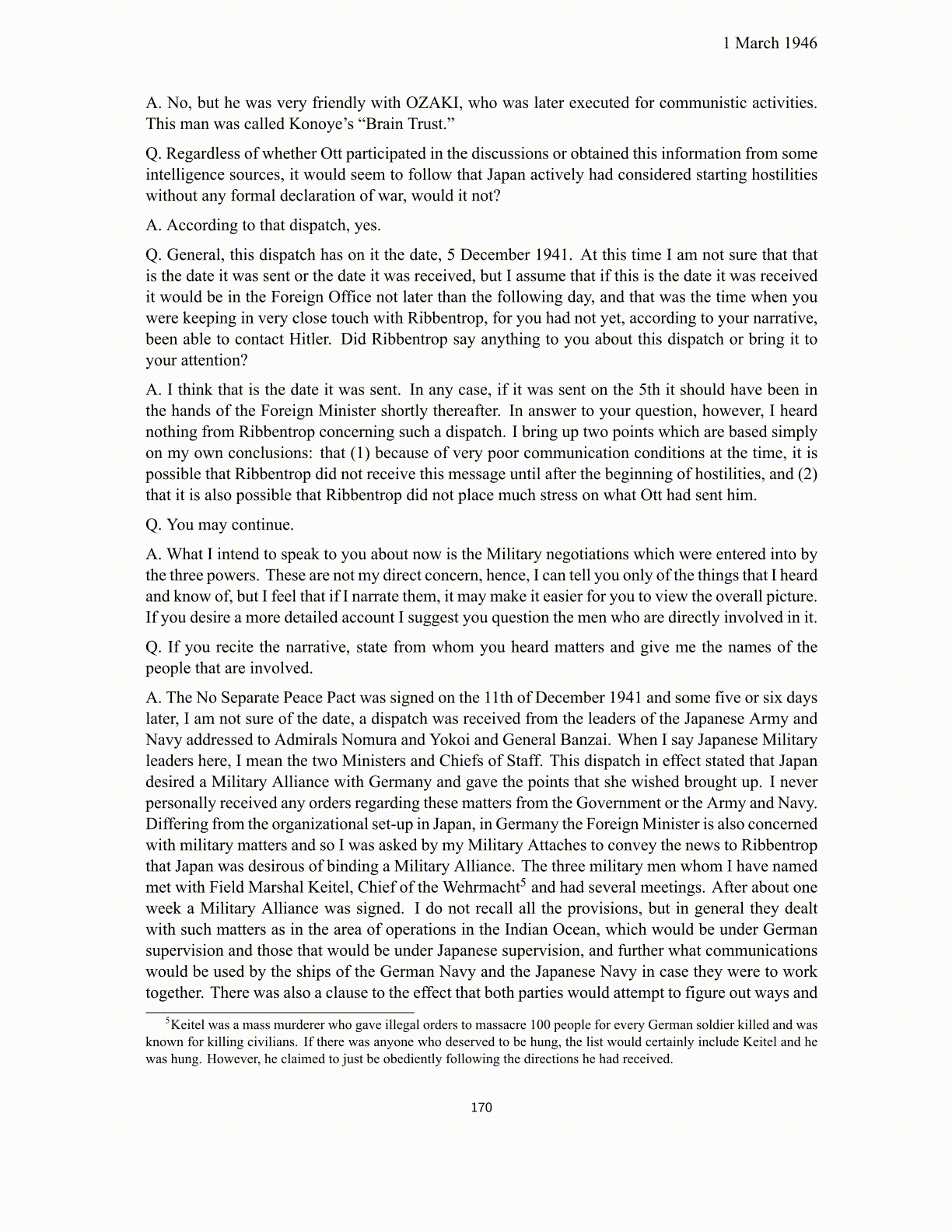
1 March 1946 A. No, but he was very friendly with OZAKI, who was later executed for communistic activities. This man was called Konoye’s “Brain Trust.” Q. Regardless of whether Ott participated in the discussions or obtained this information from some intelligence sources, it would seem to follow that Japan actively had considered starting hostilities without any formal declaration of war, would it not? A. According to that dispatch, yes. Q. General, this dispatch has on it the date, 5 December 1941. At this time I am not sure that that is the date it was sent or the date it was received, but I assume that if this is the date it was received it would be in the Foreign Office not later than the following day, and that was the time when you were keeping in very close touch with Ribbentrop, for you had not yet, according to your narrative, been able to contact Hitler. Did Ribbentrop say anything to you about this dispatch or bring it to your attention? A. I think that is the date it was sent. In any case, if it was sent on the 5th it should have been in the hands of the Foreign Minister shortly thereafter. In answer to your question, however, I heard nothing from Ribbentrop concerning such a dispatch. I bring up two points which are based simply on my own conclusions: that (1) because of very poor communication conditions at the time, it is possible that Ribbentrop did not receive this message until after the beginning of hostilities, and (2) that it is also possible that Ribbentrop did not place much stress on what Ott had sent him. Q. You may continue. A. What I intend to speak to you about now is the Military negotiations which were entered into by the three powers. These are not my direct concern, hence, I can tell you only of the things that I heard and know of, but I feel that if I narrate them, it may make it easier for you to view the overall picture. If you desire a more detailed account I suggest you question the men who are directly involved in it. Q. If you recite the narrative, state from whom you heard matters and give me the names of the people that are involved. A. The No Separate Peace Pact was signed on the 11th of December 1941 and some five or six days later, I am not sure of the date, a dispatch was received from the leaders of the Japanese Army and Navy addressed to Admirals Nomura and Yokoi and General Banzai. When I say Japanese Military leaders here, I mean the two Ministers and Chiefs of Staff. This dispatch in effect stated that Japan desired a Military Alliance with Germany and gave the points that she wished brought up. I never personally received any orders regarding these matters from the Government or the Army and Navy. Differing from the organizational set-up in Japan, in Germany the Foreign Minister is also concerned with military matters and so I was asked by my Military Attaches to convey the news to Ribbentrop that Japan was desirous of binding a Military Alliance. The three military men whom I have named met with Field Marshal Keitel, Chief of the Wehrmacht 5 and had several meetings. After about one week a Military Alliance was signed. I do not recall all the provisions, but in general they dealt with such matters as in the area of operations in the Indian Ocean, which would be under German supervision and those that would be under Japanese supervision, and further what communications would be used by the ships of the German Navy and the Japanese Navy in case they were to work together. There was also a clause to the effect that both parties would attempt to figure out ways and 5 Keitel was a mass murderer who gave illegal orders to massacre 100 people for every German soldier killed and was known for killing civilians. If there was anyone who deserved to be hung, the list would certainly include Keitel and he was hung. However, he claimed to just be obediently following the directions he had received. 170